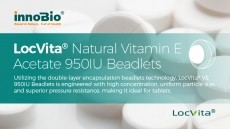Industry must wake up to tocotrienol opportunities
tocopherols, offer interesting opportunities for industry thanks to
their unique properties, scientists from Ohio State told IFT
attendees.
Presenting at the scientific studies at this year's IFT Food Expo, Chandan Sen said that because the majority of research has focused on the alpha-tocopherol form, this has led to knowledge gaps concerning the other forms of the vitamin. "I see that as a great opportunity for academia and industry to capitalise," he said. There are eight forms of vitamin E: four tocopherols (alpha, beta, gamma, delta) and four tocotrienols (alpha, beta, gamma, delta). Alpha-tocopherol (alpha-Toc) is the main source found in supplements and in the European diet, while gamma-tocopherol (gamma-Toc) is the most common form in the American diet. Tocotrienols (TCT) are only minor components in plants, although several sources with relatively high levels include palm oil, cereal grains and rice bran. While the majority of research on vitamin E has focused on alpha-Toc, studies into tocotrienols account for less than one per cent of all research into vitamin E. Sen presented data from tests of all eight forms of the vitamin, prepared synthetically and purified, on their potential ability to protect neurons. He reported that nanomole doses of tocotrienol were orders of magnitude better than tocopherol for protecting neurons. Sen noted that previous studies have suggested that tocotrienol cannot be carried to the organs because it is not transported well by the tocopherol transfer protein (TTP). However, he noted that the compound is transported via different routes with in vitro and in vivo studies suggesting that tocotrienol might be efficiently delivered to organs and could therefore offer the health benefits (Antioxidants and Redox Signalling, Vol. 8, pp. 1059-1068). The Ohio State researcher, from the only NIH funded lab in the US for tocotrienol research, also indicated that alpha-tocotrienol supplementation may decrease damage to the brain associated with a stroke (J. Neurochem. Vol. 98, pp. 1474). "Taken together, orally supplemented alpha-tocotrienol is potentially neuroprotective and should be considered as a nutritional countermeasure to contain stroke-related injury to the brain," he wrote in the abstract of his presentation. Such is the interest in dietary approaches to improve brain health the world's largest food company, Nestlé, recently signaled its intention to get a head start on the competition with the signing of an agreement in November 2006 with the Swiss Federal Institute of Technology (EPFL) to investigate the role of nutrition in cognitive function. The agreement with the EPFL, Nestlé's largest collaboration with a university of research institute, will see the company contributing up to CHF 5 million (€ 3.1 million) every year for five years, with a review after four years to potentially extend the project further. The vitamin E used in the Ohio State studies was provided by Malaysian supplier Carotech. The company claims the top spot in worldwide supply of natural tocotrienol, which it markets under its Tocomin and Tocomin SupraBio trademarks.












